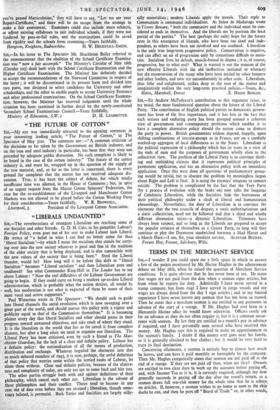" LIBERALS UNDAUNTED "
Snt,—The reverberations of resurgent Liberalism are reaching some of our Socialist and other friends. G. D. H. Cole, in his pamphlet Labour's Foreign- Policy, even goes out of his way to make Labour look Liberal. He writes of "a belief in what I can find no better name for than `liberal Socialism '—by which I mean the socialism that stands for carry- ing over into the new society whatever is gocd and fine in the tradition of the older society that is being displaced, and is also compatible with the new values of the society that is being born." Steal the Liberal thunder, would he? How long will it be before this shift to "liberal Socialism" becomes " Liberal socialism" and then Liberalism pure and unalloyed? See what Commander King-Hall in The Leader has to say about Labour: "Now the real difficulties of the Labour Government are going to begin. If they could carry on being a modern up-to-date Liberal administration, which is probably what the nation desires, all would be well, but moderation is not what is expected of them by many of their most vocal and active supporters." Paul Winterton wrote in The Spectator: "We should seek to guide into liberal channels the social revolution which is now sweeping over a great part of the world, and should pursue this policy with a vigour and publicity equal to that of the Communists themselves." It is becoming plainer every day that liberal Socialists and other should pause in their progress toward unwanted objectives, and take stock of where they stand. It is the liberalism in the world that has so far saved it from complete disaster, but after a long crisis we need to organise our liberalism. The Liberal Party has been criticised, even by such a friend as The Man- chester Guardian, for the lack of a clear and definite policy. Labour has a definite policy: the nationalisation of all the means of production, distribution and exchange. Whatever beguiled the electorate into that so much debated mandate of 1945, it is now, perhaps, the awful definition of that policy that worries some within the serried ranks of Labour, let alone those without. Clear and definite policies, because of the elusive- ness and complexity of today, are only too apt to come back and bite you.
The other parties struggle both with and against definitions of their philosophy, which cancel each other out. Liberalism is the solvent of these philosophies and their conflict. Theirs tend to become in any case OM of date even before they are attained ; liberalism, though some- times belated, is perennial. Both Tories and Socialists are largely, willy-
nilly materialists ; modern Liberals apply the morals. Their reply to Communism is communal individualism. As Senor de Madariaga wrote in Victors Beware, " both the community and the individual must be con- sidered as ends in themselves. And the liberals are by position the least partial of the parties." The best (perhaps the only) hope for the future rests in this resurgence of liberals, who have been too aloof and inde- pendent, as others have been too involved and too confined. Liberalism is the only true long-term progressive policy. Conservatism is negative, and can affect an air of progression only by contortions difficult to main- tain. Socialism lives by default, muscle-bound in dogma ; it is, of course, progressive, but to what end? What is wanted is not the reunion of the new effective Liberals with the old ineffectives (national or whatnot) but the reconversion of the many who have been misled by other banners and other leaders, and now stir uncomfortably in other seats. Liberalism, thus lithe and enlightened, strikes deep to the root of the matter and imaginatively realises the only long-term practical policies.—Yours, &c.,






























 Previous page
Previous page